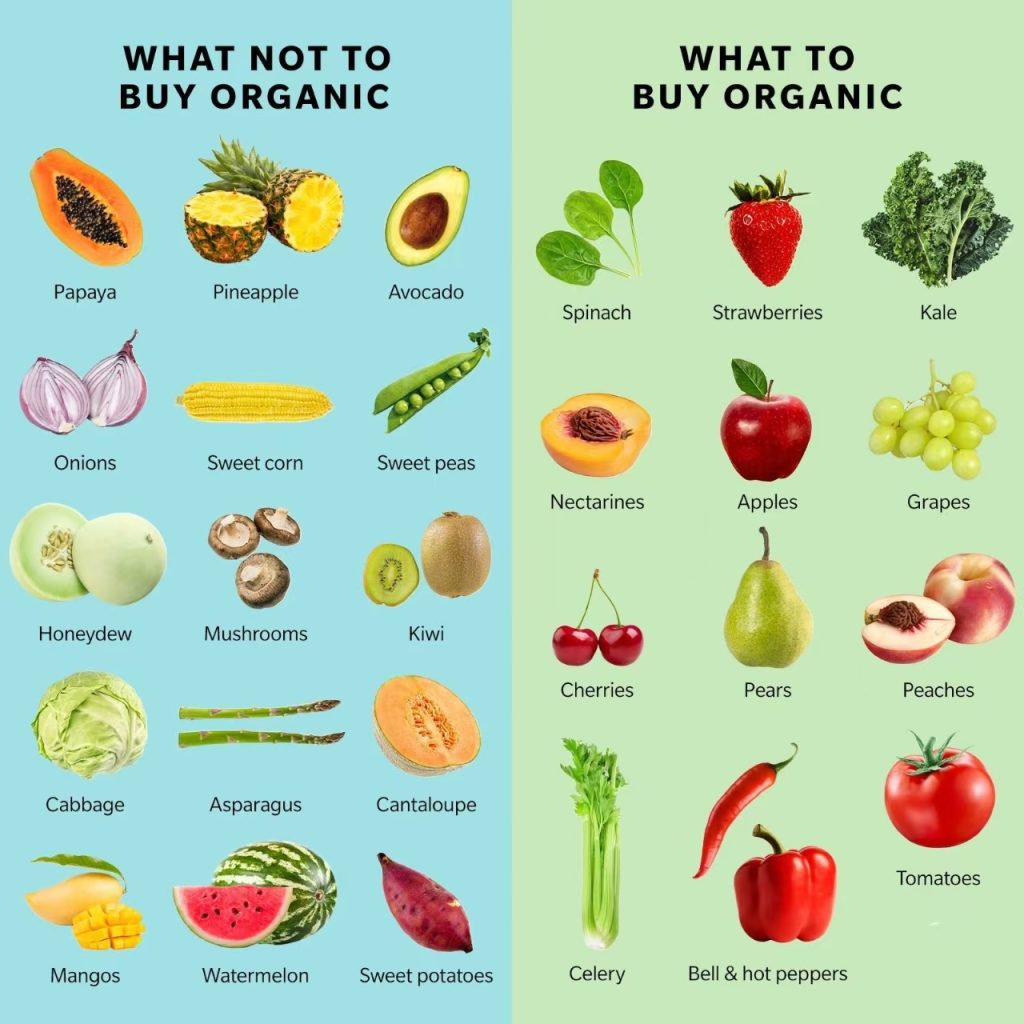In today’s supermarkets, farmers’ markets, or big-box stores, organic foods stand side by side with conventional ones, waiting to be chosen by consumers. With the growing awareness of environmental protection, people are paying more and more attention to sustainable living. Sustainable food plays an increasingly important role in this concept, considering the significant impact of food production on land and water resources. Those who are concerned about their carbon footprint may even choose to buy sustainable fish and seafood or grow their own vegetables at home. If more people can change their eating habits, the Earth will surely benefit. But in the context of sustainable diets, what impact does organic food have on our bodies? Let’s explore this in depth.
What Exactly Is Organic Food?
Organic food is grown without the use of artificial synthetic chemicals such as pesticides and fertilizers, and there is no genetic engineering involved. Currently, organic food accounts for less than 10% of the US food market, but consumption data shows an upward trend, and experts predict that this growth will continue.
To obtain organic certification, the cultivation and processing of food must follow the National Organic Program overseen by the United States Department of Agriculture (USDA). The key points of this program are as follows:
- The USDA strictly regulates all organic crops, livestock, and agricultural products. The approved production methods focus on effective resource management, ecological balance, and biodiversity.
- Products with the USDA organic label must contain at least 95% organic ingredients. The use of synthetic fertilizers, sewage sludge, irradiation, and genetic engineering is strictly prohibited.
- Every year, USDA staff conduct over 30,000 on-site inspections to ensure that the entire production process complies with organic standards.
The Health Advantages of Organic Food
Reduced Pesticide Residue
Although organic fruits and vegetables are not completely pesticide – free, the pesticides allowed for use are derived from natural sources and are much less toxic than the chemical pesticides used on conventional agricultural products. Linda Fears, a nutrition coach certified by Cornell University and founder of the wellness company goodfoodrx, mentioned, “Consuming organic agricultural products can effectively reduce exposure to pesticide residues and antibiotic – resistant bacteria.” This means that choosing organic food can help us reduce the intake of potentially harmful substances in our diet.
Potentially Higher Nutritional Value
Although there is no conclusive evidence for the potential health benefits of organic food, many studies have shown positive signs. A review covering 343 studies indicates that the antioxidant content in organic fruits and vegetables may be 20% – 40% higher than that in conventional products. Research by the Polish National Institute of Public Health also points out that organic food has lower levels of toxic metals, and higher levels of substances such as vitamin C and polyphenols (plant compounds with various health benefits, such as preventing heart disease, type 2 diabetes, and some cancers).
Controversies over the Health Advantages of Organic Food
However, not all studies unanimously support the view that organic food is healthier. A study published in the British Journal of Cancer shows that consuming organic food has no significant impact on the cancer risk of women. This indicates that in terms of the health effects of organic food, more research is needed to clarify, and currently, we cannot absolutely conclude that it is better for the body.
Price and Choice
The relatively high price of organic food is an unavoidable reality, especially during periods of inflation when people’s wallets are tight. The main reason for the high price of organic food is that the production process needs to strictly comply with USDA regulations, which naturally increases costs. As a result, when choosing food, many people are deterred by the price. Even if they know that organic food may have health advantages, they have to consider economic factors.
Organic Does Not Mean Absolutely Healthy
Nutrition experts generally recognize that organic food has many advantages. However, Sally Kuzemchak, a registered dietitian at the Healthy Family Project and founder of Real Mom Nutrition, reminds us: an organic cookie is still a cookie. This shows that even if a food is organic, it cannot be consumed without restraint. Nutritional components such as calories, sugar, and fat still need to be taken into account in a healthy diet. We cannot ignore the other nutritional characteristics of the food just because it is “organic.”
SWhich produce should you always try to buy organic

Each year, the nonprofit Environmental Working Group (EWG), releases its so-called “Dirty Dozen” list, produce that contains the most pesticides based on testing from the USDA and FDA. If you’re picking and choosing what to buy organic, these 12 items should be at the top of the list. In 2022 it includes:
- Strawberries
- Spinach
- Kale
- Nectarines
- Apples
- Grapes
- Bell and hot peppers
- Cherries
- Peaches
- Pears
- Celery
- Tomatoes
Which produce can you buy conventional?
EWG also creates a “Clean 15” list of produce with the least amount of pesticides based on the USDA and FDA info. In 2022 the list includes:
Sweet potatoes
Avocados
Sweet corn
Pineapple
Onions
Papaya
Frozen sweet peas
Asparagus
Honeydew melon
Kiwi
Cabbage
Mushrooms
Cantaloupe
Mangos
Watermelon